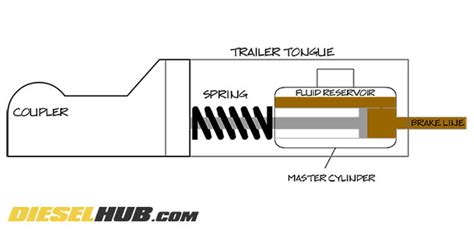How Do Trailer Surge Brakes Work
Ronan Farrow
Mar 27, 2025 · 3 min read

Table of Contents
How Do Trailer Surge Brakes Work?
A crucial safety feature for any trailer is its braking system. Understanding how it works can prevent accidents and ensure safe towing. This article focuses on surge brakes, a common type found on many trailers.
Understanding Surge Brakes: The Basics
Surge brakes are mechanical braking systems that rely on the inertia of the towing vehicle to activate the trailer's brakes. They're a popular choice for their simplicity and relatively low cost. Unlike electric brakes, they don't require any electrical connections between the tow vehicle and the trailer. This simplicity, however, also means they have some limitations.
How the Inertia Works
The core of the surge brake system is a hydraulic mechanism inside the coupler. When the tow vehicle stops suddenly, its inertia pushes the trailer forward. This forward momentum is transferred through the coupler, forcing a piston within the surge brake actuator. This action pushes hydraulic fluid through a line to the brake assemblies on each wheel of the trailer, activating the brakes.
In simpler terms: The harder the tow vehicle brakes, the more forcefully the trailer's brakes engage. This proportional braking action helps maintain stability during hard stops.
Components of a Surge Brake System
Several key components work together to make surge brakes function:
- Coupler: This is the crucial connection point between the tow vehicle and the trailer. It houses the hydraulic actuator.
- Actuator: This is the "heart" of the system, converting the forward momentum into hydraulic pressure.
- Hydraulic Lines: These carry the hydraulic fluid from the actuator to the brake assemblies. Maintaining their integrity is vital for proper operation.
- Brake Assemblies: These are located on each wheel and consist of brake shoes or discs that engage with the wheels to slow them down. Regular inspection for wear and tear is essential.
Advantages and Disadvantages of Surge Brakes
Like any braking system, surge brakes offer benefits and drawbacks:
Advantages:
- Simplicity and Reliability: Fewer components mean fewer points of potential failure.
- Cost-Effective: Generally less expensive than electric brake systems.
- No Electrical Wiring: Eliminates the need for complex electrical connections.
Disadvantages:
- Sudden Stops Can Be Jerky: The braking action can be abrupt, especially in situations requiring quick stops.
- Less Precise Control: Compared to electric brakes, offering less fine-tuned control during braking.
- Not Ideal for Heavy Loads: Might not be sufficient for heavier trailers or in challenging conditions.
Maintaining Your Surge Brakes
Regular maintenance is crucial for ensuring your surge brakes operate safely and effectively. This includes:
- Regular Inspection: Check the hydraulic lines for leaks, the coupler for damage, and the brake assemblies for wear.
- Fluid Level Check: Ensure the hydraulic fluid level is correct.
- Professional Servicing: Seek professional service for any significant repairs or concerns.
Conclusion
Surge brakes provide a reliable, albeit simpler, braking solution for trailers. Understanding how they work, their limitations, and proper maintenance practices is crucial for safe and responsible towing. Always prioritize safety and ensure your braking system is regularly inspected and maintained. If you have any doubts about your trailer's braking system, consult a professional.
Featured Posts
Also read the following articles
| Article Title | Date |
|---|---|
| How Long Can A Submersible Pump Run Continuously | Mar 27, 2025 |
| How Bad Does A Root Canal Hurt 1 10 | Mar 27, 2025 |
| How Did Heather Die In Romance In The Outfield | Mar 27, 2025 |
| How Did Molly Noblitt Bully Aubreigh Wyatt | Mar 27, 2025 |
| How Do You Care For A Frosty Fern | Mar 27, 2025 |
Latest Posts
Thank you for visiting our website which covers about How Do Trailer Surge Brakes Work . We hope the information provided has been useful to you. Feel free to contact us if you have any questions or need further assistance. See you next time and don't miss to bookmark.
